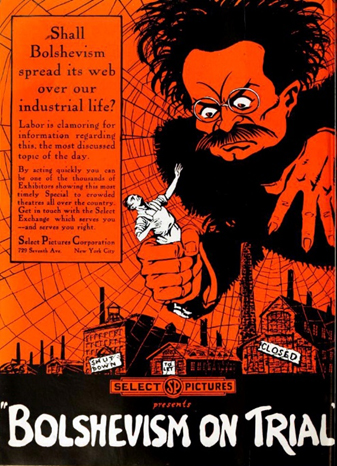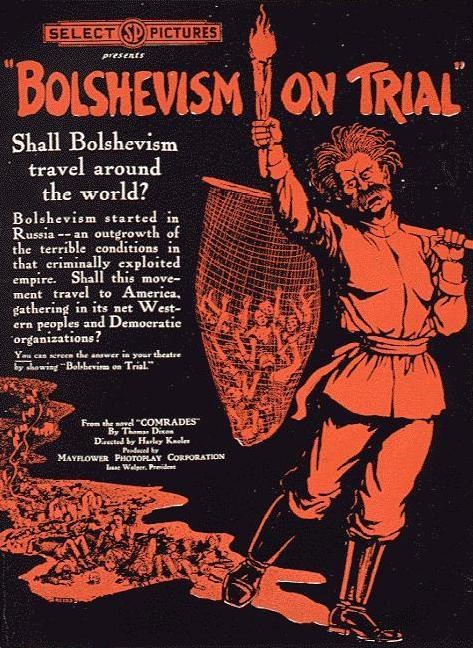| HOME | PRESENTACIÓN | ¿FILMAR LA HISTORIA? | DIRECCIÓN-REDACCIÓN | NÚMEROS PUBLICADOS | NORMAS DE PUBLICACIÓN | CONTACTOS | ENLACES |
 |
“THE COMMUNISTS ARE COMING” (1): “¡Que vienen los comunistas!”: Grad. Eva Gómez Fernández Recibido el 3 de Enero de 2023 Resumen. Thomas Dixon Jr. was an American novelist and politician born in post-Civil War North Carolina. His most famous novel was The Clansmen because it had been adapted into a film that encouraged the Ku Klux Klan (KKK) to reunite. This paper analyzes the film Bolshevism on Trial, recorded in 1919, because it was an adaptation of his writing Comrades: A Story of Social Adventure in California. Through his literature works and a hermeneutic analysis of this anti-communist and nativist silent film, it wis argued that the film, as a mechanism to indoctrinate the population, articulated a patriotic and reactionary discourse around three axes: British Israelism, an anti-democratic spirit, and an anti-feminist message. To comprehend the social reality of the historical period in which it was filmed, this paper brings to light a cinematographic witness that has not yet been discussed in detail by scholarly research. Abstract. Thomas Dixon Jr. fue un novelista y político estadounidense que había nacido en Carolina del Norte en época de posguerra civil. Su obra literaria más conocida fue The Clansmen porque se llevó a la gran pantalla inspirando a la reunificación del Ku Klux Klan (KKK). En este artículo, analizará la película Boslhevism on Trial, filmada en 1919, porque fue la adaptación de su escrito Comrades: A Story of Social Adventure in California. A través de su literatura y del análisis hermenéutico de ese filme mudo anticomunista y nativista se concluirá que la película, en tanto que mecanismo para adoctrinar a la población, articuló un discurso patriótico y reaccionario en torno a tres ejes: el israelismo británico, un espíritu antidemocrático y un mensaje antifeminista. Con ello, se dará visibilidad a un testimonio cinematográfico que ha pasado desapercibido entre los estudios académicos a fin de comprender la realidad social del momento histórico en el que se filmó.
1. Introduction Thomas Dixon Jr. (1864–1966) was born in North Carolina, a state with a long history of slavery, into a wealthy family. He was a child during Reconstruction, the post-Civil War era that lasted from 1865 to 1877 and which was marked by three important events. To start with, slavery was abolished. As a consequence, the second was the establishment of the Jim Crow Laws, a system of racial segregation that inspired the German NationalSocialist regime and that lasted until 1967. The third was Republican President Ulysses S. Grant's 1871 decision to dissolve the Ku Klux Klan (KKK), sometimes known as the first Klan, following the Civil Rights Act's passage. This background is crucial to understand Dixon's two points of reference, which were his maternal uncle Leroy McAfee and his father, the Baptist preacher Thomas Jeremiah Dixon, who served as a moral advisor to the residents of Greensboro throughout the Civil War (1861–1865). Families who had become wealthy through the slave trade lost much of their purchasing power during that time. Other families felt threatened by the alleged social gains that the democratic system had promised to the Afro-descendant community, which were actually not that many because they were subject to racial apartheid. However, supporters of the Confederate cause viewed democracy and what it stood for suspiciously: the fight for equal rights, common suffrage of the common man, votes for women, and the Marxist class struggle. Dixon's anti-democratic stance and his upbringing —he learned as a young boy that his two father figures had tracked down a former black slave because he had been suspected of raping a teenage girl in his village— were both significant influences on his philosophy (Lyerly, 2006: 81). Dixon Jr. would praise the work of the supremacist group in his novels because he and McAfee, both of whom had been members of the supremacist Ku Klux Klan organization, had done so as well. Inadvertently, Dixon Jr.'s works, Reconstruction Trilogy (1905–1907) and Socialism Trilogy (1903–1911) which served as the basis for the 1915 motion picture adaptation of The Birth of a Nation by D.W. Griffith led to the revival of the second Ku Klux Klan, which is still in existence today. But Dixon did not share the anti-Semitic and anti-Catholic characteristics of this terrorist group (Mudde, 2018:5). Instead of discussing the previously stated feature film, Bolshevism on Trial (H. Knoles, 1919) is examined in this article for several reasons. First, no previous scholarly research has been done on this movie. Second, I think the time it was created should be taken into account, which was the "First Red Scare," i.e., the American public's dread of the rise of anarchy and the radical left as a result of the Bolshevik Revolution's victory that same decade (Bennett, 1995: 183-189). The last reason relates to how literature and film can be employed for political ends to construct a discourse that indoctrinates a population lacking the skills to recognize the propagandist manipulation of both forms of cultural diffusion. The following issues are addressedon these pages: What is the British Israelism Thomas Dixon Jr. adhered to? Why did he take anti-democratic stances; and finally, What place did women hold in Dixon's worldview? After answering these queries, this paper emphasizes how closely related to a providentialist view of history —which holds that God is the key to nation-building—. The method used for this purpose is a close reading of Comrades: A Story of Social Adventure in California together with a careful revision of the scrutinized film. Since this is exclusively a hermeneutic exercise, I will explain the movie's plot before defending my points to understand the ideological components that, in my opinion, emerge in it. It was produced by the Boston-based Mayflower Photoplay Company as a silent propaganda movie, and it was released by Lewis J. Selznick's Select Pictures Corporation.
2. Bolshevism on trial a dystopia created by the US elite To make the film Bolshevism on Trial, also known as Shattered Dreams, Harley Knoles adapted Thomas Dixon Jr.'s 1919 play Comrades A Story of Social Adventure in California. Despite the novelist's advice, however, the filmmaker also took into consideration the changes Harry Chandlee had made to the script. This film production begins with Colonel Worth, a veteran who fought in the First World War, which took place between 1914 and 1918, reading the newsreel while on a break. A news item shocked him: a wealthy young woman, Barbara Bozenta, was going to head a political event dedicated to the spreading of the benefits of the communist system. Worth's son Norman, who has developed a romantic feeling for the young woman who really cared about the underprivileged, told his father that this was a good initiative. The colonel, who had amassed a fortune, decided to buy an island for a small-scale experiment in a communist regime. It was named Paradise Island. The reason the former soldier decided to buy the land was so that his son would understand that communism would only bring misery, destruction, famine and lay the foundations for a corrupt political elite. As he predicted, the initiative failed because Barbara was a tool of Herman Wolff, a manipulative and undesirable man who used the electoral mechanism to create a dictatorial community, to create a state police force that became known as the Red Guard, to legalize divorce and to deny the existence of God. When the young woman discovered Wolff's trickery, she felt cheated, but when she tried to flee, the movie's villain pounced on her with the purpose of raping her. Thankfully, Norman entered the room suddenly and stopped him. After receiving word, Colonel Worth dispatched troops to overthrow the oppressive regime in the name of God. The underlying themes of this propagandist feature film are full of misogyny as Barbara is portrayed as a good woman with a noble heart, but who in "straying" from domestic duties and, as a consequence, made mistakes because of her lack of reasoning and mental inferiority. There are also two anti-democratic features that would directly overlap with American patriotism. On the one hand, the constitution of police forces that follow orders from the central administration, in the film it is Worth, and in the case of Thomas Dixon Jr. it would be Washington DC. This disaffection with the police from the most extreme right-wing sectors advocating the creation of militias in each community, based on the premise that they are governed by the good of the locality to the detriment of police units because they are controlled by the state and are therefore prone to tyranny (Chip and Lyons, 2000:26-32). On the other hand, Dixon Jr. considered democracy to be a corrupt mechanism because it favored social inequality in which racial minorities should be subservient to whites, religious minorities to Christians, and women to men (Dixon, 2008: 113). Christian fundamentalism has an important role in this production as a form of resistance against feminism, atheism, and communism. In the following, I will point out the three pillars that are embodied in the film in order to answer the questions I raised in the introduction.
3.Subjects: the fine line separating fact and fiction The significance of God is the film's overarching message. This is nothing new in Dixon's mind because, after giving up his brief political career as a member of the North Carolina Assembly, he was ordained as a Baptist pastor and championed a theocentric-based social system that encouraged harmonic inequalities (Dixon, 2008:44). Anglo-Israelism, also known as British Israelism, was a branch of Christian fundamentalism that claimed that Anglo-Saxons were God’s chosen people (Chip and Lyons, 2000: 121). This millenarianist and imperialist movement has its roots in British theorists of the 18th century who, based on their colonization activities, distorted history, religion, and ethnography for propagandist means. According to this perspective, the Israelites would be made up of two peoples; the Jews, who would be the descendants of the Kingdom of Judah, and the British Israelites, circumscribed to the Tribe of Joseph (Hine, 1902: 15). Joseph, in turn, would have two descendants, Ephraim and Manasseh, who would represent the British and the North Americans (Allen, 2017:68-73). Hence, they were united by language, customs, and even whiteness. The latter not only acquired a racial matrix but also assumed a supremacy based on cultural and social terms (Garnier, 1890 32). The appropriation of all these elements led to the development of a xenophobic and racist undercurrent which was molded into a racial biological determinism of an anti-Semitic sign. It is no accident that Herman Wolff, the story antagonist, was portrayed in Bolshevism on Trial with physiognomic traits that were evocative of the satirical caricatures used to depict Jews with an intention to demonize them. The same may be said for the film's many covers, but one of them is particularly interesting because it depicts a communist strangling a laborer (Picture 1).
The person depicted in the promotional looked like Leon Trotsky, who was a Jewish politician and thinker from Ukraine who worked to democratize the bureaucratic centralism of the Communist Party of the Soviet Union (CPUS). Because of Joseph Stalin, the dictator, Trotsky was a supporter of Leninism, and he was forced to flee to Latin America (Picture 2).
The rise of communism was a product of industrialization and the ensuing class struggle. This in turn promoted democracy and the emancipation of women. Two ideas that the Greensboro natural pastor had promoted through his social preaching harmed the social order (Brundage, 2006: 27). Modernization, therefore, subverted traditional gender roles in which women had to be subservient to the male’s will and perform domestic duties such as the upbringing of children and the elderly (Dixon, 2008:44). These were confined to an ideal of femininity that emerged in Victorian times that was called the "The Angel in the House". As communism, socialism, and anarchism gained notoriety, suffragism, from its most conservative to its most anarchist section, made numerous social gains. Women sympathetic to this cause were soon demonized, abused, and even martyred with pejorative terms to emphasize their supposed inferiority, such as “asexual”, “nymphomaniac” and/or “defective” (Dixon, 2018: 32). Women who had liberated themselves from the household role typically worked in factories, but most of the time their wages were so precarious that many were forced into prostitution. If the ideal wife represented "The Angel in the House" archetype, this new ideal of femininity that had emerged during modernization created the "Public Demon" type of character. The author of Comrades: A Story of Social Adventure in California occasionally equated communism and suffragism, but Dixon Jr. understood democracy, which emerged during the French Revolution, and communism in Europe as two foreign traits that worked to corrupt women (Dixon, 2011: 70). Barbara Bozenta represented that type of corruption. The inseparable facets of American patriotism that are portrayed in this motion picture are still applicable today.
4. Final remarks Thomas Dixon Jr. was an American politician born in the mid-19th century who used novels and films for propaganda purposes to spread anti-communist and patriotic sentiments that demonized democracy, communism, and feminism. His narrative resonated with a capitalist, imperialist, Christian society that regarded the sociocultural transformations his nation was experiencing with skepticism. The 1919 film Bolshevism on Trial is a remarkable example of mass indoctrination because it includes four of the five characteristics of American nationalism, namely Christianism, nativism, an attack on democracy and a hetero-patriarchal system. . The fifth element —racial discrimination— does not come up in the movie, but there are two main reasons that could explain this. The first, although Dixon Jr. had constantly recounted it in his work when The Birth of a Nation was brought to the big screen in 1915 the director, D.W. Griffith, was accused of racism and the president of the time, Woodrow Wilson, was also accused because he congratulated the filmmaker for having portrayed the "heroic" Ku Klux Klan in such an "accurate" way. The second does not appear because it was not necessary for that chronological framework, given that Bolshevism on Trial denounces the communism that was spreading in Europe and America at the time. These notes, in their conclusion, seek to explore a propaganda product that was significant in the US since it formed the cornerstone of the nation's anti-communism, which peaked during the Cold War.
Notes (1) The American Revolutionary War, which lasted from 1775 to 1783, is when the phrase "The British are coming" first appeared. Paul Revere, who served as the war's courier, may have come up with this motto. By warning his compatriots about the coming of the British army, which was during the conflict associated with tyranny, Revere became a symbol of American patriotism. Because the novelist Thomas Dixon Jr. associated communism with the foreign foe that could infiltrate the United States as a result of the success of the Russian Revolution of 1917, the author of the paper substituted the term “British” with “Communists”.
Bibliography ALLEN, J.H., Judah's Sceptre and Joseph's Birthright, A.A Beauchamp, Boston (Mass.), 2017. BENNET, D.H., The party of fear: The American Far-Right from Nativism to Militia Movement, Vintage Books, New York, 1995. BRUNDAGE, W.F., “Thomas Dixon: American Proteus”, en GILLESPIE M.K. et alii (eds), Thomas Dixon Jr. and the Birth of Modern America, Louisiana State University Press, Baton Rouge, 23-45. CHIP, B. y LYON, M.N., Right-Wing Populism and America: Too Close for Comfort, The Guilford Press, New York, 2000. DIXON, T. Jr., The Clansman an Historical Romance of the Ku Klux Klan, The DIXON, T. Jr., Comrades: A Story of Social Adventure in California , The Project Gutenberg, 2011. DIXON, T., The One Woman: A Story of Modern Utopia, The Project Gutenberg, 2018. GARNIER, J., Israel in Britain. A Brief Statement of the Evidences in Proof of the Israelitish Origin of the British Race, Robert Bank & Son, London, 1890. HINE, E., The British Nation Identified with Lost Israel, Robert Bank and Sons, London, 1902. LYERLY, C.L., “Gender race in Dixon’s religious ideology”, en GILLESPIE M.K. et alii (eds), Thomas Dixon Jr. and the Birth of Modern America, Louisiana State University Press, Baton Rouge, 80-104. MUDDE, C., The Far-Right in America, Routledge, New York, 2018. . Filmografía GRIFFITH, D.W, The Birth of a Nation, USA, 1915. KNOLES, H., Bolshevism on Trial, USA, 1919.
ISSN 1988-8848
|

